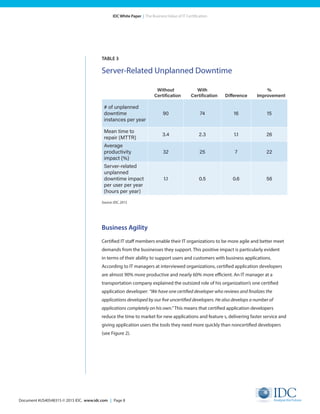Certified IT staff provide benefits to organizations including:
- 17% higher productivity for server, database, and application teams
- 56% less unplanned downtime
- 58% faster time to market for applications
- 39% less time for new hires to reach full productivity
The study found that IT staff with certifications were more efficient, able to handle more complex issues, support other staff members, help applications experience less downtime, enable faster delivery of applications, and allow new hires to reach full productivity faster. Organizations reported improved IT operations and agility from having certified staff.
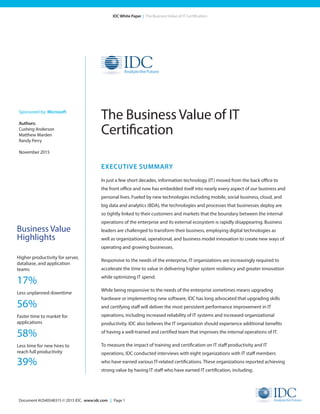
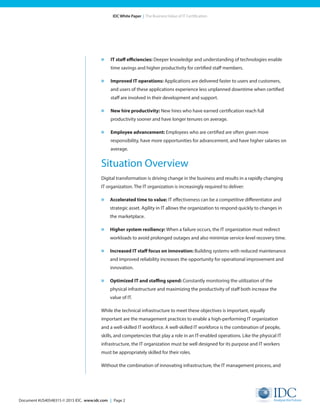
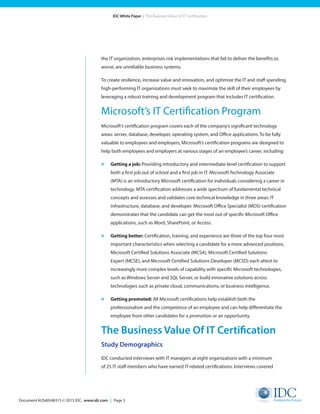
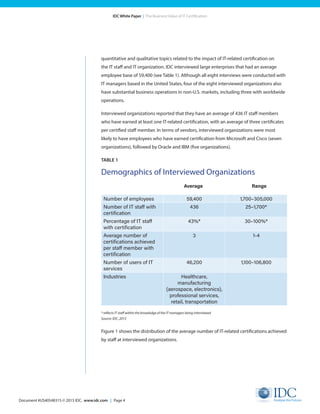
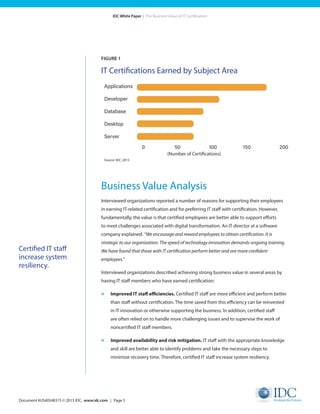
![Document #US40548315 © 2015 IDC. www.idc.com | Page 6
IDC White Paper | The Business Value of IT Certification
» Increased business agility. IT organizations are more agile and deliver better-
performing applications and services in less time by having certified staff members.
» Improved productivity and reduced cost. Employees with certification reach full
productivity upon being hired and tend to stay with their organizations longer.
As a result, interviewed organizations have reduced costs associated with hiring
new employees and minimized the disruption to operations caused by employee
turnover.
IT Staff Efficiencies
IT organizations realize substantial value by having IT staff members with certification.
Interviewed organizations reported certified staff members are more productive, can
handle more complex issues efficiently, and are able to support and supervise the work
of uncertified staff. This means that IT organizations require less staff time to support
day-to-day operations for datacenter infrastructure, database operations, and application
development efforts. Table 2 demonstrates the extent of these staff efficiencies for the
eight interviewed organizations. IDC calculates that teams with certifications responsible
for core IT activities are almost 20% more productive.
TABLE 2
Overall IT Staff Impact — Interviewed Organizations
# of FTEs
Without
Certification
With
Certification Difference
%
Improvement
Server team 78 66 12 15
Database team 63 47 16 26
Application
development
team
93 82 12 12
Total 233 194 39 17
Source: IDC, 2015
Interviewed organizations perceive advantages in having certified staff who generate
efficiencies:
» Better understanding of evolving technologies and priorities. Certified staff have
the knowledge and training to support complex and evolving technologies. An IT
manager at a retailer said: “It’s about the knowledge and the confidence. Certified staff
understand the concepts. Also, security technology is now in the forefront. In years past, it
“[Certified staff]
are more aware of
security issues and
technology,”said
an IT manager at a
retailer.
“[Certified staff] …
provide a higher
level of support,”
said an IT manager
at a technology
company.](https://image.slidesharecdn.com/ae9cde19-3250-4b1c-b103-e728b225fdef-160427073848/85/BVW-Microsoft-US40548315-6-320.jpg)
![Document #US40548315 © 2015 IDC. www.idc.com | Page 7
IDC White Paper | The Business Value of IT Certification
was in the background. From their certification experience — studying and testing — they
are more aware of security issues and technology.”
» Ability to handle more complex issues. Certified IT staff members are often given
responsibility for more challenging work critical to IT operations. An IT manager at
a technology company explained: “When it comes to server management, we have a
tiered approach. The most important tasks are with the certified team members. They in
fact spend less time on them than noncertified team members but provide a higher level of
support.”
» Support work of noncertified staff members. IT staff members with certification
are able to support noncertified or junior employees, improving the quality of their
work and providing them with valuable guidance. An IT manager at a multi-national
company said: “Less complex applications [are] developed by staff without IT certification.
[Those] applications are tested and approved by someone with IT certification before
being released.”
Risk Mitigation and Availability
Applications and systems perform better and experience less unplanned downtime
with the support of certified IT staff members. According to interviewees, certified staff
members reduce the frequency and duration of unplanned outages as a result of deeper
knowledge and the ability to apply their knowledge. The IT manager at the technology
company explained: “It is the in-depth knowledge that helps with any issues that might arise.
We find it leads to a methodical approach to resolution by handling issues with confidence
and capability.” As a result, their organizations experience fewer instances of unplanned
downtime, resolve outages in less time, and reduce the impact on users. Certified staff
members supporting servers and applications reduce the impact of unplanned downtime
on users by 56% compared with noncertified IT staff (see Table 3).
Certified staff
members
supporting servers
and applications
reduce the impact
of unplanned
downtime on users
by 56%.](https://image.slidesharecdn.com/ae9cde19-3250-4b1c-b103-e728b225fdef-160427073848/85/BVW-Microsoft-US40548315-7-320.jpg)
